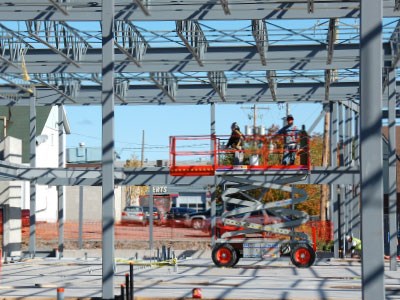The City of Sault Ste. Marie is considering implementing development charges for new building projects in the city.
Fees collected from developers go toward the cost of linking new residential, commercial and industrial buildings to amenities like roads, sewer, water, and hydro. The Sault is currently one of the few municipalities in Ontario without development charges, but that could change if city council approves them later this year.
Jerry Dolcetti, the city’s commissioner of engineering and planning, said he’s unsure why the city hasn’t had development charges in place in the past, but suggested it was perhaps thought to be an advantage in attracting new business and development to the city. Yet history doesn’t show that to be the case, he noted.
“That really hasn’t happened to the extent where we could draw analogies like that,” Dolcetti said.
Charging development fees — permitted under the province’s Development Charges Act — is a mechanism designed to help municipalities raise money for community projects, such as a new recreational facility, or adding a lane of traffic to a road where traffic patterns have increased following the growth of a new subdivision, Dolcetti said.
If approved, the Sault would introduce the charges through a staged implementation process, similar to what Sudbury did when it adopted development fees, Dolcetti added. For example, if a developer is charged $7,000 for a single residential unit, instead of paying the $7,000 in one shot, the fees would be phased in over a three-year period to reduce the strain on the developer.
“There’s no question that it adds to the cost of building a home, or for that matter, if you’re an industrial site,” Dolcetti said, “because there are also development charges that apply to industrial or commercial.”
Charges are typically based on square footage for industrial and commercial properties, and for residential units, they’re based on whether it’s a single- or multi-unit dwelling and how many bedrooms are included.
The thought of adding financial burden to an already-depressed construction market is worrisome for Adam Pinder, manager of the Sault Ste. Marie Construction Association.
“There’s concern that downloading this cost to the contractors up front is going to hurt the development that we’re already struggling to get here in Sault Ste. Marie,” Pinder said. “There’s been a lot of concern expressed to me from a big section of my members, talking about what this could potentially do to cause a downturn in some of the development that we see.”
Pinder said development charges are more fitting for high-density urban areas like those in southern Ontario where growth is more rapid and the population is flourishing. But in Northern Ontario, where the population has stagnated, development charges don’t make sense.
“We’ve never been a booming, thriving centre, and I think if we were dealing with those economic conditions we’d be more supportive of bringing in charges like this to help offset the cost,” Pinder said. “But we don’t see that type of development and that type of population increase, which makes it all that more concerning to bring more charges.”
Northern Ontario is already challenged by harsh winter climates, which increase construction costs, and higher tax rates, which already put the North at a disadvantage, he added.
Sault Ste. Marie would be further disadvantaged because it’s currently one of three Northern communities — the other two are Timmins and Thunder Bay — that don’t have development charges, argues Jason Naccarato, vice-president of the Sault Ste. Marie Chamber of Commerce.
“If you’re trying to attract investment to the North, and Thunder Bay and Timmins don’t have development charges, then the communities that do have development charges are at a disadvantage, because it’s a substantial cost to the developer,” Naccarato said.
The chamber is voicing its opposition to development fees in a report being delivered to council.
Because the city’s economics are poor right now, it’s a bad time to introduce extra charges, the chamber argues. The Sault has been impacted by crashes in oil and steel, and there’s been a corresponding dip in employment, including recent layoffs at both Essar Steel Algoma and Tenaris Algoma Tubes, two of the city’s largest employers.
“We took a look at the top 12 employers in the Sault,” Naccarato said. “After Essar, when you take all the trades — plumbers, electricians, general labourers, carpenters, painters — and put them all together, we’re saying the trades are the second highest employer in Sault Ste. Marie, and these development charges are directly going to impact trades.”
Naccarato said that, since introducing development fees, both Sudbury and North Bay have seen a significant drop in development. Instead of introducing fees in the Sault, he said, the chamber has offered to work with the city to find other avenues of raising revenue.
For example, in the Sault, there’s no additional charge if a building inspector has to return to inspect a project six or seven times because it’s not meeting the Ontario Building Code. The chamber argues that developers could get two free inspections and then have to pay if they require subsequent visits.
Dolcetti said he’s sympathetic to the chamber’s concerns, but added there are few channels available to the municipality that would help raise revenues the way development fees would.
“We’re very conscious of wanting to add additional costs to anything,” he said. “However, it gets to the point that we’re going to get less and less money from the upper levels of government, because they’re also strained in their abilities to provide. So we need to be able to find other measures.”
Watson & Associates, which was commissioned by the city in 2012 to study the issue, is expected to present its report soon, after which there will be a period of public consultation. It will then be left to council to decide if it wants to implement development charges or not.
If approved, Dolcetti said it could still be late 2016 before the fees are implemented.




